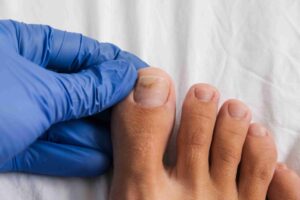Learn more about the effects of Diabetes on our feet and how to take care of them
Foot care is particularly important if you have diabetes. Foot problems are a common complication of this condition. Your feet can be affected in two ways. Blood supply may be affected, resulting in slower healing. You may also lose some feeling in your feet due to nerve damage. A person whose nerves are damaged by diabetes may not realise they have minor cuts or blisters, which can lead to ulcers. Diabetic foot ulcers are associated with significant morbidity and mortality and can subsequently lead to hospitalisation and lower limb amputation if not recognised and treated in a timely manner.
Daily checks when you have Diabetes
It’s important to check your feet every day.
If you see any of the following- get medical treatment that *day *:
- Ulcer
- Unusual swelling
- Redness
- Blisters
- Ingrown nail
- Bruising or cuts
If you see any of the following on your feet, get medical treatment within 7 days:
- Broken skin between toes
- Callus
- Corn
- Foot shape changes
- Cracked skin
- Nail colour changes
Circulation in People with Diabetes
Poor blood circulation can affect the blood supply to your feet. When this is reduced, cuts and sores may not heal. An early sign of poor circulation to the feet may be pain or cramps in the backs of your legs when walking.
Hardening or narrowing of arteries as they become clogged up can result to circulation problems. Common causes include:
- smoking
- high blood fats
- raised blood glucose levels.
Nerve Damage
Poor blood glucose management can cause nerve damage to feet. Symptoms include:
- Numbness
- Coldness of the legs
- A tingling, pins and needles sensation in the feet
- Burning pains in the legs and feet, usually more noticeable in bed at night.
These symptoms can result in a loss of sensation in the feet which increases the risk of accidental damage because you can’t feel any pain. An injury to the feet can develop into an ulcer on the bottom of a foot which can penetrate to the bone. This could lead to infection of the bone (osteomyelitis) and a chronic infection in the bones and joints. If an infection isn’t treated at the earliest signs, this could result in ulceration (an infected open sore) and eventually amputation (removal of a toe, foot or limb).
Daily Foot Care for People with Diabetes
Suggestions to help prevent foot problems in people with diabetes who suffer from neuropathy or vascular disease include:
- Check your feet daily for signs of swelling, redness or heat – these may be signs of infection.
- Wash your feet daily and dry well between the toes.
- Use methylated spirits if there is a lot of moisture between your toes.
- Moisturise dry skin, especially cracked heels (for example, with sorbolene cream) but not between the toes.
Are you suffering from this condition? One of our podiatrist can assist and then recommend what treatment options are best to get you back on track. ✅
Schedule an appointment here or you may call us at 44 (0) 207 101 4000. 📞
We hope you have a feetastic day! 👣☀️
-The Chelsea Clinic and Team




